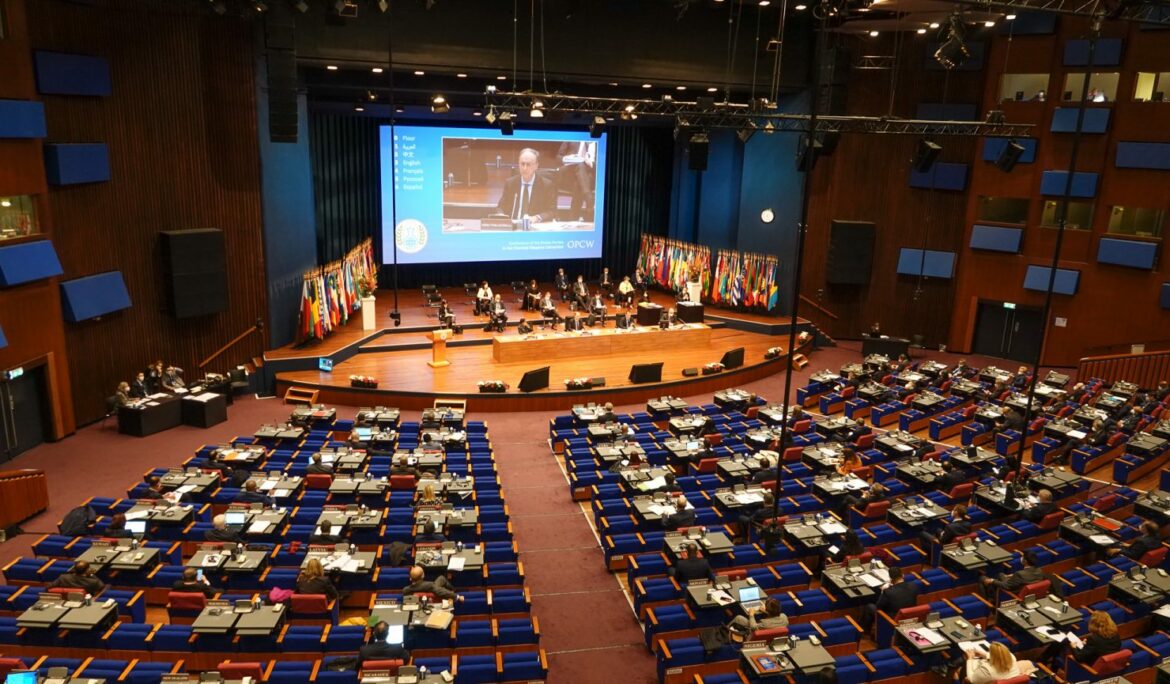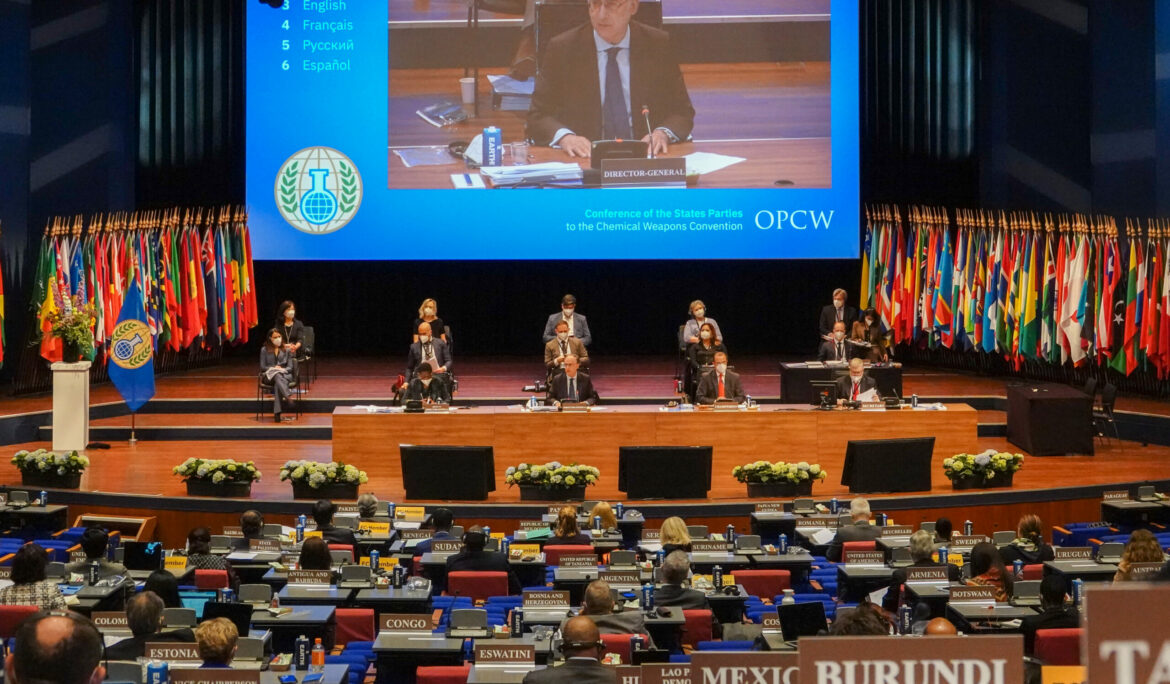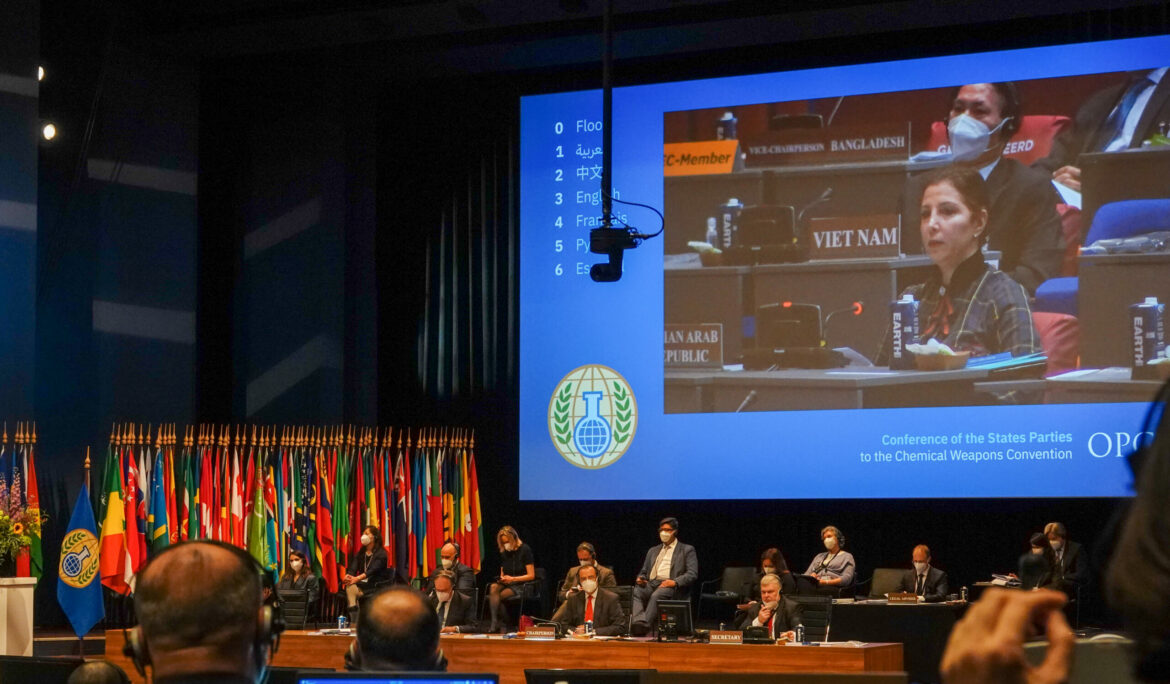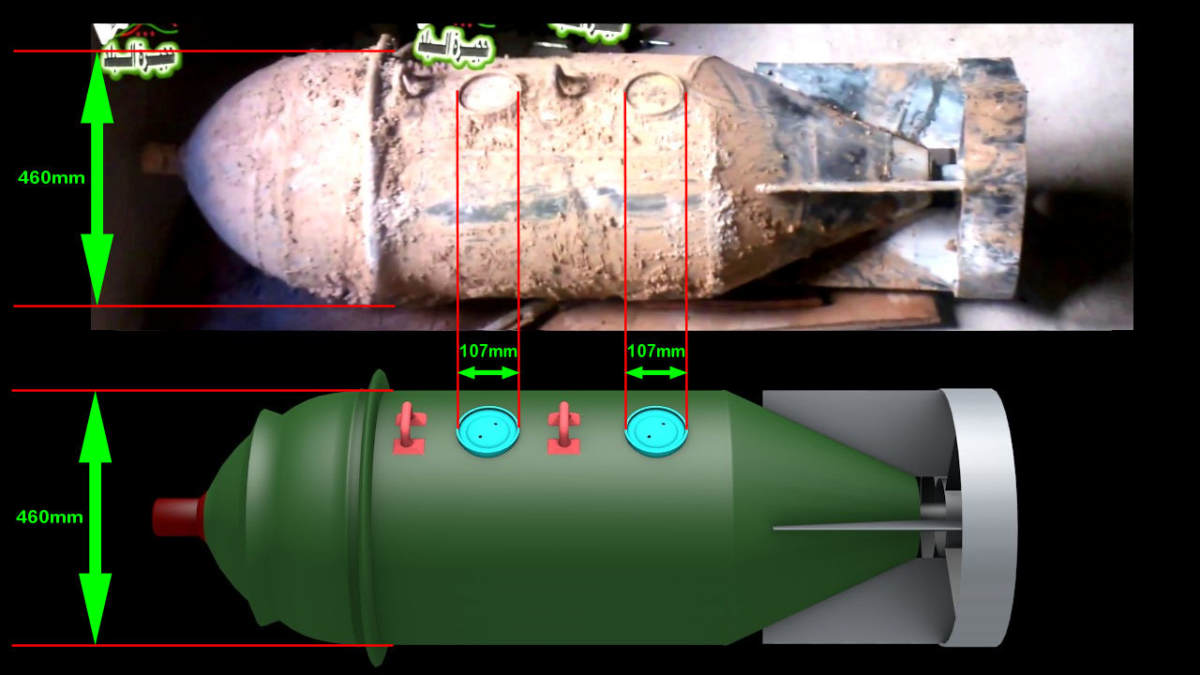Confidence in disarmament: some insights from the treaties banning biological and chemical weapons
Confidence in disarmament: some insights from the treaties banning biological and chemical weapons (Video presentation, delivered in French on the occasion of the 10th anniversary of the Initiatives pour le désarmement nucléaire (IDN).) Hello everyone! I thank the organisers for inviting me to participate in this symposium to celebrate the 10th anniversary of the IDN. Congratulations! As you listen to my pre-recorded presentation, I am travelling from The Hague, where I attended the annual meeting of the States Parties to the Chemical Weapons Convention (CWC), to Geneva, where I will participate in two and a half weeks of meetings of …
OPCW: 26th Session of the Conference of the States Parties (CSP-26)
I am pleased to present here the summary of the annual OPCW Conference of States Parties, prepared by Leanne Quinn of the CWC Coalition. The Trench is a member of the CWC Coalition. Jean Pascal Summary Report by Leanne Quinn Program Assistant, Chemical Weapons Convention Coalition (Cross-posted from the CWC Coalition Conference summaries) During the annual Conference of the States Parties to the Chemical Weapons Convention (CWC), representatives from all the States Parties to the CWC convene in The Hague to oversee the implementation of the CWC, promote the goals and obligations of the treaty, and review treaty compliance, among …
Remarks at the CWCC webinar on ‘Reinforcing the Norm Against Chemical Weapons’
Remarks at the webinar Reinforcing the Norm Against Chemical Weapons: The April 20-22 Conference of States Parties to the Chemical Weapons Convention, organised by the Chemical Weapons Convention Coalition and the Arms Control Association, 10 May 2021 Director-General Arias, Ambassador Helfand, Ambassador Lingner, Participants, I am pleased to join this webinar of the global non-governmental platform, the Chemical Weapons Convention Coalition (CWCC). As a CWCC member from the start, I wish to express my gratitude to Paul Walker, who has been the engine behind the initiative for as long as it has existed, and to the states parties to …
Sanctioning Syria: An Analysis of the OPCW Vote
The Organisation for the Prohibition of Chemical Weapons (OPCW) completed its 25th session of the Conference of the States Parties (CSP) on 22 April, the 106th anniversary of the first massive use of chlorine as a warfare agent in the First World War. Due to the sanitary restrictions to contain the global coronavirus pandemic, the OPCW spread the CSP-25 over two sittings. The first one took place on 30 November and 1 December 2020. Its primary objective was the adoption of the work programme and budget for 2021, which the states parties to the Chemical Weapons Convention (CWC) could not …
Apparently major chemical weapons attack near Damascus reported
As I am writing, disturbing news reports are coming in of a major chemical attack on the eastern eastern outskirts of Damascus (Ghouta district). According to images and film footage posted to the Internet by opponents to the al-Assad regime, many casualties, including fatalities can be seen. Supplementary visual testimony strongly indicates poisoning. [Images are graphic and should be viewed with caution!] In past blog postings and commentaries I have been sceptical of CW claims, because the narrative accompanying images and film footage did not correspond with what could be seen. More importantly, a number of things one would expect …
Syria stands formally accused of violating the Chemical Weapons Convention
The Executive Council of the Organisation for the Prohibition of Chemical Weapons (OPCW) held its 94th session from 7–10 July. Prominent on the agenda was the determination by the Investigation and Identification Team (IIT) that ‘there are reasonable grounds to believe’ that Syrian government forces bear responsibility for several chemical weapon (CW) attacks at the end of March 2017. The finding is the first time that the Technical Secretariat of the OPCW has formally charged a state party to the Chemical Weapons Convention (CWC) with violating Article I, para. 1(b) to never under any circumstances use CW. The accusation is …
Roundtable invitation: Syria’s Chemical Demilitarization
INVITATION Syria’s Chemical Demilitarization: Progress, Challenges, and Lessons A Roundtable Discussion with Dr. Paul F. Walker, Amb. Serguei Batsanov, Dr. Ralf Trapp, & Dr. Jean Pascal Zanders Introductory Remarks by Dr. Alexander Likhotal Organized by Green Cross International, Pugwash Conferences on Science and World Affairs, and the Chemical Weapons Convention Coalition Monday, May 19, 2014, 17:00-19:00 WMO Building, 7 bis avenue de la Paix, 2d floor Vieira de Mello auditorium Syria’s accession to the Chemical Weapons Convention (CWC) in September 2013 made it the 190th State Party to the Convention with only six countries now remaining outside the treaty regime. …
Must the Belgian babies be bayoneted all over again?
August, 100 years ago: the Hun from the east invaded little, neutral Belgium. In the opening weeks of the campaign the Hun was not a good boy. He wilfully executed civilians, raped women, destroyed historical monuments and burned down university libraries—all war crimes that have been extensively documented. The worst barbarian acts, however, he committed against babies. He cut off their hands, so that the grownup man could never take up arms against the Hunnic master. Worse, he tossed them in the air and caught them on his bayonet. Alas, each investigated claim proved to be a myth. Meanwhile, many …
Until silence
Children and babies—whether born or unborn—suffer immensely in any armed conflict. Mental trauma from witnessing human wasting, which no person should really be exposed to anymore. Physical injuries that scar the young ones for the rest of their lives, even if a sense of normalcy could ever be recaptured. And death, often considered the worst possible outcome, but nonetheless a fortuitous escape from a lifelong suffering inflicted by a senseless war ripping apart the early stages of their far too many young lives. For the survivors—bereft parents and mothers of the stillborn one—deep-reaching psychological wounds far beyond consolation. Until the …
Syria: Disarmament in animated suspense
Syria has now missed about every single deadline since it was unable to move the Priority 1 chemicals out of the country by the end of last year. These even include renegotiated time frames and the self-imposed final date of 27 April. One more fixed date is pending: 30 June, by which time all precursor chemicals should have been neutralised. It would now seem that the world will sigh with relief if everything is aboard the Danish and Norwegian freighters by the end of next month. US officials envisage 60 working days to neutralise the volume of precursor chemicals and …






